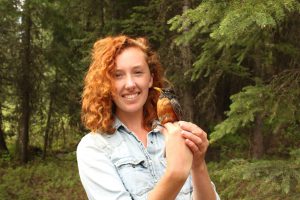
GAINESVILLE, Fla. — Savannah Troy, a doctoral student studying interdisciplinary ecology, earned the runner-up spot in the University of Florida Graduate School’s Three Minute Thesis competition.
Troy’s dissertation research focuses on savanna ecosystems in southern Africa. For the competition, Troy presented, “Do Little Herbivores Make Big Impact? A Cross Continental Comparison of Savanna Trophic Cascades.” Through her presentation, she discussed the trophic interactions, or complex food chains, of birds, insects and trees in the savanna ecosystems of Eswatini, formally known as Swaziland. Troy also acknowledged how her research can impact the conservation of savanna ecosystems.
Three Minute Thesis is a research competition originally developed by the University of Queensland in Australia. The competition challenges students to make a compelling presentation for their thesis topic and explain its significance in just three minutes. The competition helps students develop academic, presentation and research communication skills while also providing them with an avenue to explain their research to a non-academic audience.
“I think part of the competition is to see how well you can come up with a story about your work for any audience,” Troy said. “I had to think about what small pieces of the overall picture would be the most compelling for them to hear about.”
This year’s virtual competition was open to any UF graduate student. Students first submitted a three-minute video recording of their presentation and the top 10 videos were then selected to present live via Zoom.
As the runner-up, Troy received a prize of $400.
The skills Troy gained through the competition are key to her future career as she hopes to work in academia and become a professor with a research program. Troy is currently in her second year of her doctoral program with plans to graduate in 2025.
Wildlife ecology and conservation professor Robert Fletcher serves as Troy’s advisor for her dissertation research. Fletcher said part of his time mentoring Troy is dedicated to sharpening her science communication skills. In fact, they dedicate specific time each week to communicate their science, making sure their work is easily understood by all audiences.
“I think this accomplishment highlights many of Savannah’s strengths as an early-career scientist,” Fletcher said. “Savannah is a curious, dedicated scientist with strong initiative and she is very articulate in her thinking and communication. She is able to harness each of these attributes to discuss her work with others in a clear and compelling way.”
Two additional CALS students, Trenton Aguilar and Costanza Manes, were also selected as top 10 finalists in the Three Minute Thesis competition. Aguilar, a fisheries and aquatic sciences doctoral student, presented his research, “Vessel Impacts on Green Turtles in Florida,” and wildlife ecology and conservation doctoral student Manes presented her research, “Assessment of Environmental Drivers in Prevalence of Fibropapillomatosis in Green Turtle Populations.”
-30-
The College of Agricultural and Life Sciences (CALS) administers the degree programs of the University of Florida’s Institute of Food and Agricultural Sciences (UF/IFAS). The mission of the College of Agricultural and Life Sciences is to deliver unsurpassed educational programs that prepare students to address the world’s critical challenges related to agriculture, food systems, human wellbeing, natural resources and sustainable communities. The college has received more total (national and regional combined) USDA teaching awards than any other institution.
 0
0
